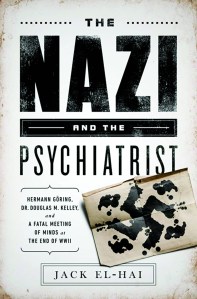In the fuselage of a C-47 transport plane, a group of high-ranking Nazis in uniforms stripped of their insignia are facing their captors. Among them, Hermann Göring strikes up a conversation with a U.S. military psychiatrist, Lt. Colonel Douglas Kelley. “Howie here tells me you do magic,” Göring says to Kelley. Kelley nods and shows him a quick coin trick. “Very good,” Göring responds. “But I am going to show you a real magic trick someday. I am going to escape the hangman’s noose.”
It is then that Robert Ley, the Nazi head of the German Labour Front, spots something out of the window. “Nürnberg,” he announces. As the rest of the group takes in the sight of the bombed city, their destination is clear. The Palace of Justice is one of the few buildings that remain standing. Their trial will soon begin.
It is an uncanny scene to watch play out on a soundstage in Budapest in 2024. There’s anticipation from both sides in this plane, as each tries to work out whether the Allies’ gamble, to try the defeated Nazi regime for its war crimes, will pay off. And that electricity never leaves the air in the two days Deadline spends on the set of James Vanderbilt’s new thriller Nuremberg, which comes to the Cannes market as surely one of the year’s hottest acquisition titles.
Based on Jack El-Hai’s book The Nazi and the Psychiatrist, Nuremberg tells the story of Kelley’s interactions with the group of Nazi criminals tried at the end of the war. As well as Göring and Ley, Kelley was the first Allied psychiatrist to evaluate Nazi leaders like Rudolf Hess, Julius Streicher and Karl Dönitz. And while the trials themselves have been adapted to film before — notably in Stanley Kramer’s 1961 epic Judgment at Nuremberg — Kelley’s particular take on what he witnessed has been largely ignored.
Kelley was young and eager to prove himself, but as he faced the men that had brought the world into its deadliest war, he came to understand the ease with which evil can pervade society. He returned from the trials determined to sound a warning that such a malignant slide would be possible again if it weren’t properly guarded against. But in the immediate relief of the war’s end, few were prepared to listen.
The Nuremberg trials exposed the dark secrets of the Nazi regime, but they also reassured people that the monsters had been dealt with. Kelley’s book about his experiences, and the warnings it contained, failed; overshadowed by the work of Gustave Gilbert, the psychologist brought in to reevaluate his findings. Kelley ultimately died by suicide in 1958 having taken potassium cyanide, the very same drug that Göring had indeed used to “escape the hangman’s noose” after his conviction.
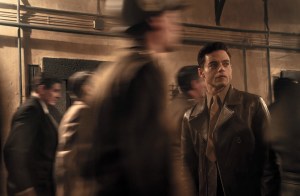
Rami Malek as Douglas Kelley in James Vanderbilt’s Nuremberg.
Scott Garfield
Vanderbilt had started thinking about this story even before El-Hai’s book had been published in 2013. “I read his book proposal, which was about the relationship between Kelley and Göring,” the writer and director tells Deadline during a break in shooting. “I learned about the Nuremberg trials in school, so I knew the basic facts. But as soon as I read about the relationship between these two men, I was really attracted to the idea of telling a personal story between them and how they collided at this crossroads in history.”
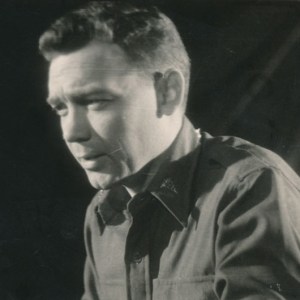
The real Douglas Kelley
What also fascinated Vanderbilt was a generational shift he saw in understanding about the events of World War II. “I took it all on faith, that of course the Nuremberg trials had happened, that justice was done. Both my grandfathers fought in the war. I had many friends whose grandparents were in the camps. But when I talked to my kids about World War II, it was like talking to them about the American Revolution. It is so much further removed from their generation. It felt like a great opportunity to tell a story that brings these events back to life and says, ‘This wasn’t at all a fait accompli.’”
Though Vanderbilt’s work may have started more than a decade ago, the lessons Kelley tried to teach seem as pertinent now as they’ve ever been. “Unfortunately, the film has become timelier rather than less timely,” says Vanderbilt. “But the thing I always loved about this story is that it’s actually timeless. It’s the old adage that those who don’t learn from history are doomed to repeat it. The easiest way to for us to do harm to other people is to look at them as other; as different from us. We assume they’ll dress like Nazis and announce themselves as bad guys, but that’s not the way the world works. That’s not how terrible things can happen.”
Vanderbilt did research of his own, too, into the machinations that went into building the unprecedented trials, in which justices from the Soviet Union, the UK, the U.S. and France sat in judgment. It was at Nuremberg, where proceedings were diligently recorded and dispersed in newsreels, that the world first saw footage from inside the Nazi concentration camps; irrefutable evidence of the horror of the Holocaust. Into his script for Nuremberg, Vanderbilt weaved the story of U.S. prosecutor Robert Jackson, who along with his British counterpart Sir David Maxwell Fyfe questioned Hermann Göring on the stand.
While other actors had attached themselves to Nuremberg’s vision of Göring over the years, when the script landed on Russell Crowe’s desk, he couldn’t resist the prospect. “For the most part, the things that attract me are the things that terrify me,” Crowe tells Deadline. “I responded to the script straight away, but in a funny way I was also emotionally exhausted by it. How would you even attempt to play that guy? When that kind of question comes up, that’s usually what I’m attracted to.”
He laughs. “It’s also why you haven’t seen me do 15 variations on Gladiator. And to this day, I still haven’t done a sequel, which I consider a rare badge of honor.”
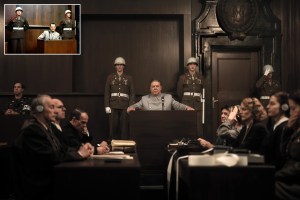
Russell Crowe as Herman Göring and (inset) the real Göring on trial at Nuremberg.
Scott Garfield
Crowe, too, responded to how prescient the story was. “Kelley wouldn’t acquiesce to the common story of Nazism at the time, which was the story that the Allies wanted to push, that this was a group of madmen. These people were involved in some very dark things that came out of situations that shouldn’t have directed them in that way. We see a lot of this type of politics of circumstance going on now, where in order to hold power, people are willing to go beyond established rules. Göring was willing to get into bed with people he ordinarily might not have, because of the circumstances he was in.”
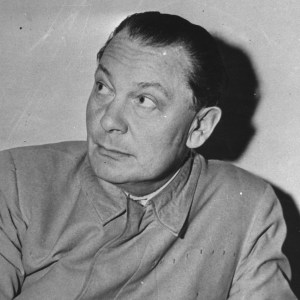
Herman Göring in jail at Nuremberg
He adds: “We were brought up to believe that the guy talking to us has a passion, and that he’s chosen public life to serve people. The time period we’re living through now, over the last 10 years maybe, we’ve seen a completely different kind of animal coming out of the jungle: a person that just wants to be in power. They’ll say anything, do anything, if it keeps them in that privileged position. It’s very, very dangerous. Here we are again with the same kind of tubs being thumped and drums being banged that could lead us to incredible darkness.”
Crowe’s clarion call, and Vanderbilt’s gripping script, attracted the attention of producer Richard Saperstein, whose Bluestone Entertainment has teamed with the Walden Media and Széchenyi Funds to finance the production. He’d read the script for Nuremberg in 2016 when it was in other hands, and when it came back around, the company leapt at the chance to make it.
In short order, an all-star cast assembled including Rami Malek as Kelley, Michael Shannon as Jackson, Richard E. Grant as Fyfe, and Colin Hanks as Gilbert. John Slattery plays Colonel Andrus, who kept the Nazi prisoners, and Leo Woodall plays Sgt. Howie Triest, a German Jew who had fled to New York at the outbreak of the war, and who was drafted by Andrus to translate.
There are heavyweights behind the camera too, including cinematographer Dariusz Wolski, production designer Eve Stewart, and hair and makeup designer Jan Sewell. “Everybody here is a top person,” says Saperstein, “and it’s because there’s something about this script and subject matter that brings passion out in them.”
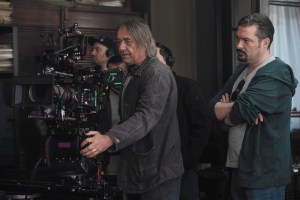
Writer-director James Vanderbilt (right) lines up a shot with cinematographer Dariusz Wolski on the set of Nuremberg
Scott Garfield
“It was one of those rare scripts where you don’t want to touch a single beat; there’s not one word out of place,” says Malek. “James has got such a good sense of rhythm and pacing, and you feel there’s a motor to the script — some driving force behind it — and it propels you from scene to scene.”
In addition to reading El-Hai’s book, Malek was able to unearth a copy of Kelley’s 22 Cells in Nuremberg, the long out-of-print book he had written about his time with the prisoners. He also shared the books and the script with a psychiatrist, who was able to help him home in on Kelley’s obsessive nature. “I always find myself drawn to characters who are still tethered to events in their life, who are acting now in an attempt to reconcile their past,” Malek explains. “So, for Kelley, he has this need, an obsessive need, to prove his worth, to do something ‘great’.”
In Göring, Kelley found a subject who could be as charming, humorous and devoted to his family as he was ruthlessly unrepentant about the having conspired to commit the greatest atrocities in history. “He couldn’t help but empathize with [Göring],” Malek says. “For Kelley to be so convinced that he was there to ‘dissect evil,’ as he explains in his book, and then to discover there’s nothing uniquely evil about Göring; in fact there’s humanity in there. He realized that anyone at any moment in any political landscape could be capable of an atrocity like that. How jarring, and how absolutely terrifying that must have been.”
In numerous moments throughout the film, Kelley and Göring spar as the young American comes to grips with this larger-than-life tyrant. As Malek and Crowe bring their interplay to life in the cramped jail-cell set Stewart and her team meticulously re-created to match the real location the Nazi criminals were held, the dynamic between them is charged.
“To say the hair stands up on the back of my neck doesn’t quite cover it,” says Walden Media’s Cherilyn Hawrysh. “This is what it’s like to watch two Academy Award-winning actors at their fullest.”
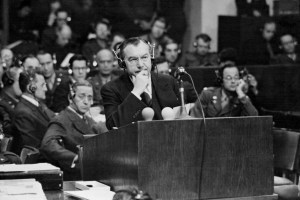
U.S. prosecutor Robert Jackson at Nuremberg. He will be played by Michael Shannon in the film.
Getty
“It has been an incredible learning experience for me, watching these two titans go toe-to-toe,” says Woodall, who has found himself in the room for numerous scenes between the two ready to translate, although Göring spoke good English. He recalls a scene in which the two of them extended the dialogue past the point the take should have cut; just kept their back-and-forth going. “At one point Rami turned to me and said, ‘Howie, what do you think?’ And I just said, ‘What?’” He laughs. “I nearly responded in my British accent, because I was so immersed, and I’d completely come out of character.”
But it’s not as though the degree of difficulty hasn’t been there for Woodall too. Howie isn’t just a German speaker, but a native German speaker, and Woodall … isn’t. “I didn’t speak a lick of German, and in the first scene I shot I was translating heavily between Rami and Russell. I was thrown in at the deep end, but Howie is such a complex, fascinating person. I think you want to feel like the work you do matters, and with this, it really does.”
Can art change the world? It’s a lofty question to put on any piece of work. Nuremberg has clearly assembled a cast and crew hellbent on keeping this story alive, and Vanderbilt’s script has been the glue holding them here. As for that bigger question … “Well, it might be a slim hope, but it’s the only one I’ve got,” says Crowe. “This has been a great shoot and I’ve really enjoyed it, purely from an acting perspective. But it has been a mentally pressurized shoot just because of the subject matter. The reminder that these are human beings, and they made these decisions as a collective because it’s what they could get away with. It’s a very scary thing.”
Says Malek, “I was apprehensive about whether I could have the conviction on who this guy was to go toe-to-toe with Russell, and Michael, and the rest of the cast. But, in this particular case, the legend happens to be the film, and it isn’t legend; it’s truth. There’s a reason everyone has been drawn to this, and we’re all reaching to do our best work. When you find a gem like this that not only entertains, but also reveals something about humanity, reminds us of our faults, and perhaps allows us to question how we walk through the world, that’s powerful.”
Nuremberg, which is being repped for worldwide sales by WME Independent, with Nick Meyer’s Sierra Pictures consulting, will make its debut to buyers with a footage presentation in Cannes on Thursday. Principal photography has only recently wrapped, so Vanderbilt and his crew still have a long road ahead to finish the film. But it will have been worth it. “Kelley is fascinating to me because he’s largely become a footnote in history, and he’s been forgotten,” the director says. “I love stories that take you into something big that you think you know about, but that take you in through the backdoor. I think where he got to in terms of his analysis of all of them, and Göring in particular, was fascinating, and genuinely brave given it was not a popular viewpoint. I’m excited to tell his story, warts and all, happy ending or not.”

